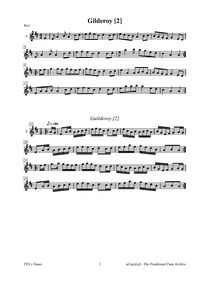Template:Pagina principale/Vetrina: Difference between revisions
No edit summary |
No edit summary |
||
| Line 13: | Line 13: | ||
|f_article=[[Gilderoy_(2) | '''Guilderoy''']] | |f_article=[[Gilderoy_(2) | '''Guilderoy''']] | ||
The | The title Gilderoy is an Englished version of the Gaelic ''Gilleruadh'' or ''Giolla Ruadh'', meaning red-haired lad or youth. Historically, Gilleruadh was the nickname of a famous Scottish highwayman named Patrick McGregor who was captured and executed in 1636; the song describes his exploits and moralizes on his fate. John Purser says the tune was known by around 1660 as it was referred to in a broadside of that period. | ||
Glen records that the tune was first printed in the British Isles in 1726 (where it appears in Alexander Stuart's Musick for Allan Ramsay's '''Collection of Scots Songs''', p. 194, in the key of 'A'), in William Thompson's '''Orpheus Caledonius''' of 1733 and again in 1742, though Cazden (et al, 1982) dates the tune as "possibly from 1650," perhaps to coincide with the demise of the famous highwayman [which is speculation since no sources were cited]. | |||
It quickly became popular and appears in the later 18th century Scottish collections of Aird, Bremner, Gillespie (1768), Oswald (1744 in '''A Second Collection of Curious Scots Tunes''', later republished with different variations in his '''Caledonian Pocket Companion'''), McGibbon, and McLean (1772) {where it is ascribed to Robert McIntosh}. | |||
}} | }} | ||
Revision as of 18:24, 15 October 2023

Played by: Rob MacKillop
Source: Soundcloud
Image: Historically, Gilleruadh was the nickname of a famous Scottish highwayman named Patrick McGregor who was captured and executed in 1636.

The title Gilderoy is an Englished version of the Gaelic Gilleruadh or Giolla Ruadh, meaning red-haired lad or youth. Historically, Gilleruadh was the nickname of a famous Scottish highwayman named Patrick McGregor who was captured and executed in 1636; the song describes his exploits and moralizes on his fate. John Purser says the tune was known by around 1660 as it was referred to in a broadside of that period.
Glen records that the tune was first printed in the British Isles in 1726 (where it appears in Alexander Stuart's Musick for Allan Ramsay's Collection of Scots Songs, p. 194, in the key of 'A'), in William Thompson's Orpheus Caledonius of 1733 and again in 1742, though Cazden (et al, 1982) dates the tune as "possibly from 1650," perhaps to coincide with the demise of the famous highwayman [which is speculation since no sources were cited].
It quickly became popular and appears in the later 18th century Scottish collections of Aird, Bremner, Gillespie (1768), Oswald (1744 in A Second Collection of Curious Scots Tunes, later republished with different variations in his Caledonian Pocket Companion), McGibbon, and McLean (1772) {where it is ascribed to Robert McIntosh}.
...more at: Guilderoy - full Score(s) and Annotations
X:1 T:Gilderoy [2] M:4/4 L:1/8 R:Reel K:Amix V:1 clef=treble name="1." [V:1] F2|EA2B A2 cd|efec d2 cd|edcB A2 Bc|BAGF G2 ED| EA2B A2cd|efec d2 cd|ea2b aged|c2A2A2:| |:ef|g2 gf gfef|gfec d2 cd|e2A2 ABcA|BAGF G2 ED| EAAB A2 cd|efec d2 cd|eaab a2 ed|c2A2A2:||
